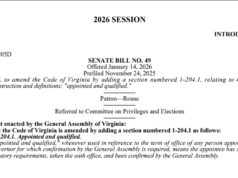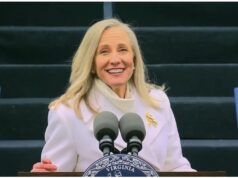by Virginia Secretary of Education Atif Qarni
I have gotten a lot of advice from people all over Virginia about what I should say publicly on Governor Northam’s actions. I have privately shared my feelings with a few folks and the Governor.
People of color who serve in the Northam Administration—and there are many of us—do not need to prove our loyalty or disloyalty to anyone. We serve the people of the Commonwealth. We also do not need advice from well-intentioned white allies, telling us what to say or do. This is an individual choice and there is a lot of reflection we must all do.
Experiences of several marginalized communities pale in comparison to the Black experience in America. I have had a few unpleasant experiences with law enforcement; however, I can’t imagine what it must feel like to be slammed to the ground and handcuffed without cause. Or even worse, shot dead. My wife wears a hijab and when she and I travel by air, I feel like all eyes are on us; however, I can’t imagine what it must feel like to have your actions be monitored and scrutinized every day of your life, even while running basic errands. I feel anger that my ancestors were colonized by white people; however, I can’t imagine living in a country where my ancestors were trafficked, shackled, beaten, raped, lynched, and enslaved. White and other people of color can empathize and try to relate to the Black experience in our nation; however, no one can truly grasp the depth of the pain, trauma, humiliation and anguish felt by Black Americans over the last 400 years in this country.
If we truly care about addressing institutional racism for all people of color and marginalized communities, then we need to address school choice. School boundaries in many parts of the commonwealth are drawn to accommodate the affluent and the white. Parents use loopholes like specialty programs and Governor’s schools to self-segregate. If that doesn’t work, they make the financial “sacrifice” to send their child to a private school. This self-segregation has increased ignorance and intolerance. It is not just white people, we are all guilty of it. I have had these conversations with many of my affluent Muslim, Latino and Black friends. The rationale is that we want what’s best for our child academically, but we ignore the social ramifications of separating our child from other children that are on a lower income scale or not as academically gifted. These children turn into adults and the chasm that divided them as children, only widens as they take different paths beyond high school.
I chose to be a Democrat because I believe that Democrats are more inclusive of marginalized communities and sensitive to their needs. Democratic party leaders of Virginia are worried that Republicans will weaponize the events of this past week in the upcoming local elections of 2019. I believe that our grassroots activists, who are truly the heart of the party, will ensure that Democrats are successful this year. While we are still in a conversation about Governor Northam’s actions and what it means to be a Democrat in Virginia, I want to remind folks that our elected officials in Virginia, at the highest levels of influence, are still pretty much white men.
Of the five statewide elected officials, all of whom are Democrats, only one is a person of color—Lieutenant Governor, Justin Fairfax (not a single woman by the way). If you look at Northern Virginia, which is the most diverse region of the state, the congressional representation is all white Democrats. If you look at the 12 state senators who represent parts of Northern VA, 10 of the 12 are white Democrats. If you look at county elected officials, we are starting to see more people of color running for office and this is a positive indication of changes to come. When you have varying perspectives in leadership positions, you will have a better conversation on policies and be able to make better decisions when you know how they would impact ALL people.
The Commonwealth has an ugly history and change is taking too long. As we reflect on the last few days, we must acknowledge the 400-year history of Virginia and ask ourselves how we can shape a future for our children, so that they don’t need to have this same conversation when they are adults.










![[UPDATED 1/29/26] Audio: Sen. Tim Kaine Talks to Blue Virginia About His “Five-Point Plan” to Fight Trump’s Orban-Like Assault on US Democracy; Civil Disobedience a la MLK Jr.; Trump’s Bogus “Energy Emergency”; the Crucial Importance of the 2025 VA Elections; etc.](https://bluevirginia.us/wp-content/uploads/2025/02/kaineinterview2-100x75.jpg)
